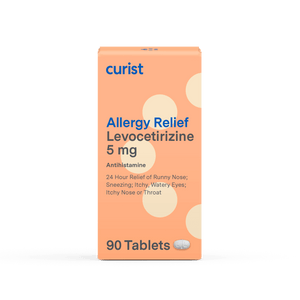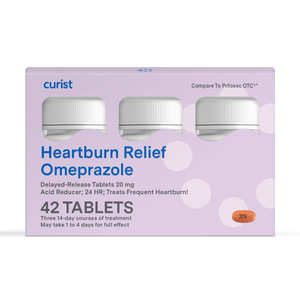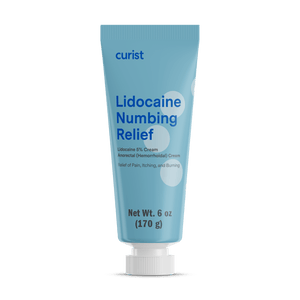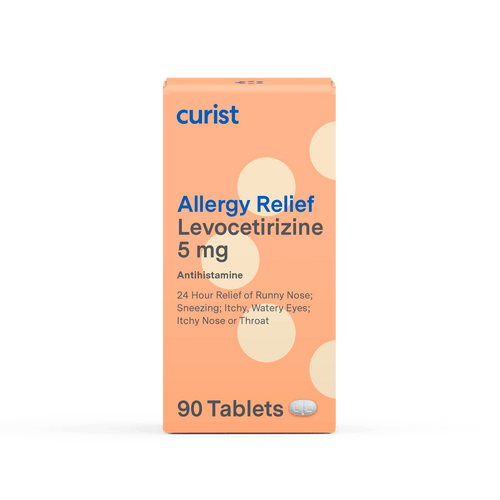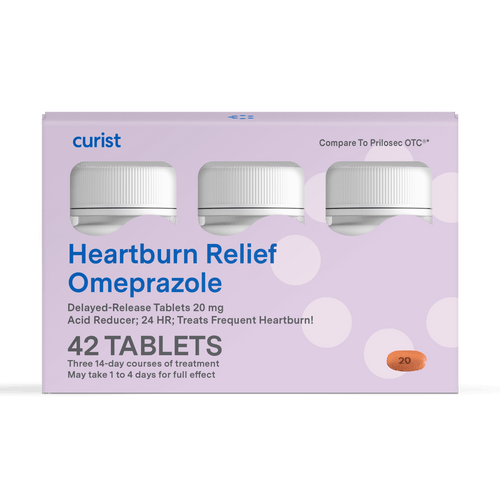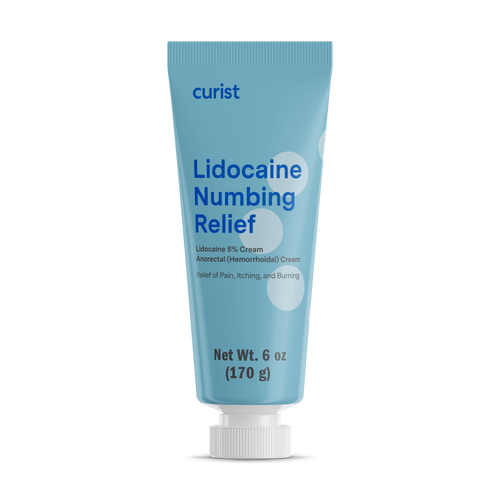Acetaminophen vs Tylenol | Ibuprofen vs Motrin | Naproxen vs Aleve | Asprin | Comparisons
Curist delivers over-the-counter medicines to your door at a fraction of the price of traditional brands. We hope everyone stays safe and healthy during this time.
You have a fever, but what should you take? You have muscle pain, but what should you take? There are plenty of different over-the-counter options that can help relieve some of your symptoms, so here are some tips and tricks when it comes to self treatment!
What is Acetaminophen vs Tylenol? What Does Acetaminophen Treat?
Acetaminophen is a medicine that works both as an analgesic (relieves pain) and antipyretic (reduces fever). Acetaminophen is sold under several brand names, including Tylenol, Paracetamol, and Curist. All of these brands sell the same medicine (acetaminophen).
Acetaminophen is commonly used to treat minor aches and pains, and to reduce fever. Some examples of what acetaminophen treats includes:
- Headache, backache, toothache
- Minor pain of arthritis
- Premenstrual and menstrual cramps
- Muscular aches
- Minor aches and pains from common cold
- Fever reliever
Warning: Please do not take acetaminophen with alcohol, and people with liver problems should take caution before taking acetaminophen.
What is Ibuprofen vs Advil vs Motrin? What Does Ibuprofen Treat?
Like acetaminophen, ibuprofen is an analgesic (relieves pain). It is classified as a nonsteroidal anti-inflammatory drug (NSAID), which means that it can help fight inflammation. Advil and Motrin are two of the most common brands of ibuprofen.
Ibuprofen can be used to treat many of the same symptoms as acetaminophen such as (but are not limited to):
- Headaches
- Inflammatory diseases and rheumatoid disorders (arthritis)
- Toothaches (consult with your dentist first before taking)
- Menstrual cramps
- Fever
- Muscle, joint, and back pain
Warning: Unless directed by a healthcare provider, ibuprofen should not be taken on a daily basis because it can increase risk of stomach bleeding and kidney problems. People with pre-existing heart problems or kidney problems should speak with a healthcare provider before use. Because of these additional side effects of ibuprofen, acetaminophen is often preferred to take over ibuprofen unless recommended otherwise by a doctor.
What is Naproxen Sodium vs Aleve? What Does Naproxen Treat?
Like ibuprofen, naproxen sodium is also considered a nonsteroidal anti-inflammatory drug NSAID. Aleve is the most common brand of naproxen. Naproxen lasts for 12 hours, so it is the longest duration action compared with acetaminophen and ibuprofen.
Naproxen can be used to treat the same symptoms as ibuprofen (like headaches, fever, and muscle pains). However, unlike ibuprofen, there is children’s version of naproxen (it is only recommended for children 12 and up).
Aleve has different ingredients than ibuprofen, but is also considered a NSAID. It can be used for the same things as Advil/Motrin. However, there are no children’s Aleve, and it is recommended only for children 12 and up.
Warning: Do not take naproxen for more than 10 consecutive days for pain, or 3 days for fever unless directed so by a healthcare provider. For people with kidney problems, take naproxen with caution and consult with a healthcare provider first. Avoid using naproxen and ibuprofen if you experienced an allergic reaction to aspirin.
What is Aspirin? What Symptoms Does Aspirin Treat?
Aspirin is the most different from the products above. It is considered an analgesic (reduces pain), a NSAID (like ibuprofen and naproxen), and an antiplatelet agent. Antiplatelet agents work by preventing blood cells from sticking together, so it can help reduce blood clots. Aspirin is recommended for ages 12 and up. There is a low dose tablet (81 mg), and a high dose tablet (325 mg). Although aspirin is used similarly to the above products, it is used more-so for heart conditions such as:
- Acute coronary syndrome
- Prevention of ischemic stroke
- Management of stable ischemic heart disease
- Stroke
Warning: Not appropriate for children under 12 years because of their risk of Reye’s syndrome. Do not take the higher dosage on a daily basis because it can increase risk of stomach bleeding.
Acetaminophen vs Ibuprofen vs Naproxen vs Aspirin
Because of the number of medicines available, it can be very confusing when deciding what treatment to use. Here are some quick tips when deciding how to self-treat your symptoms.
- For people with kidney problems, make sure to avoid NSAIDs (Advil®, Aleve®, aspirin) because it can make kidney condition worse. Please discuss with a healthcare provider.
- For people with liver problems, make sure to avoid acetaminophen (brand Tylenol) because it can make liver conditions worse. Please discuss with a healthcare provider.
- For children under 12 years of age, acetaminophen is preferred for fever.
- Make sure to avoid alcohol while taking any of these products because it can cause more toxicity to the body.
- For people with aspirin-induced hives, wheezing and /or history of nasal polyps, avoid aspirin and all NSAIDs. Acetaminophen is usually tolerated in those with aspirin allergy.
Acetaminophen vs Ibuprofen vs Naproxen vs Aspirin For Fever
How can you best treat a fever? First and foremost, confirm a fever by taking temperature with a thermometer. Generally, a temperature higher than 98.6 degrees fahrenheit indicates a fever. Try a few non-medical treatments before taking medications.
- Apply a damp towel with tepid water on the forehead to help lower the fever.
- Rest and remain hydrated to cool down the body
- Although fever is associated with chills, it’s important to avoid layering clothes because it can make a person’s body temperature remain high.
For treatment, the best over-the-counter meds are acetaminophen (brands Tylenol and Curist) or ibuprofen (brands Advil and Motrin). Naproxen (brand Aleve) and aspirin are not recommended to lower fevers.
Acetaminophen vs Ibuprofen vs Naproxen vs Aspirin For Headaches
There are different types of headaches that people can have:
|
Tension Headaches |
|
|
Sinus Headaches |
|
|
Migraine Headaches |
|
Tension headaches and migraines can be treated similarly, with acetaminophen (brand Tylenol and Curist), ibuprofen (brands Advil and Motrin), naproxen (brand Aleve) or aspirin. Because everyone’s body is different, these medications can work differently for each person, so there is not a “best” treatment regimen. For migraines, prescription medications may be necessary.
Sinus headaches can be treated with decongestants (like pseudoephedrine) which are available behind-the-counter at a pharmacy with a valid ID). A spray to reduce nasal congestion, like Curist Allergy Nasal Spray, can help too.
Acetaminophen vs Ibuprofen vs Naproxen vs Aspirin For Cramps
There are different types of cramps. For muscle cramps, it is important to drink plenty of water and hydrate your body with electrolytes. It is important to also rest and apply either ice or heat over sore muscles. Any of these over-the-counter medications can help with muscle cramp pain.
For menstrual cramps, acetaminophen and ibuprofen are the most widely used medications. Brand Midol is a combination pill that contains acetaminophen and caffeine to help relieve menstrual cramp pain. A heating pad can be used as well to help reduce the pain in the lower abdomen area where most menstrual cramps are located.
Acetaminophen vs Ibuprofen vs Naproxen vs Aspirin For Arthritis
There are two different types of arthritis that are treated differently with over-the-counter medications. Osteoarthritis (OA) is caused by mechanical wear and tear on the joints. OA is most commonly treated with acetaminophen (brands Tylenol and Curist). On the other hand, inflammatory arthritis (Rheumatoid arthritis), is most commonly treated with ibuprofen (brand Advil and Motrin) to fight the inflammation within the joints. It is important to discuss what treatment is best with a healthcare provider.
Can I Take Acetaminophen & Ibuprofen (Tylenol & Advil) Together?
You CAN use both acetaminophen & ibuprofen, but they must be spaced 3-4 hours apart when taking together. In fact, this is a great combination that many doctors recommend because the two medicines work differently on the body to help relieve symptoms.
Pros, Cons & Side Effects of Acetaminophen vs Ibuprofen vs Naproxen vs Aspirin
|
MEDICATION |
SIDE EFFECTS |
PROS |
CONS |
|
Acetaminophen |
|
|
|
|
Ibuprofen |
|
|
|
|
Naproxen |
|
|
|
|
Aspirin |
|
|
|




